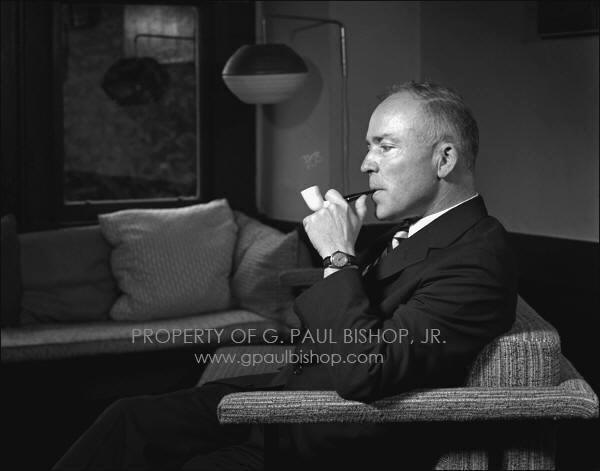|
|

"Richard Eberhart"
Photographed by g. Paul Bishop, '56
©2019 G. Paul Bishop, Jr.
- IMAGE NO
LONGER AVAILABLE -
Richard
Eberhart
(Richard Ghormely Eberhart)
1904 - 2005
Poet
Pulitzer Prize for Poetry, 1965
-----
List of Additional Images
Richard Eberhart 2
-----
List of Additional Links
Richard Eberhart
From Wikipedia, the free encyclopedia
www.wikipedia.org
-----
Richard Eberhart
was born in Austin, Minnesota, on April 5, 1904. His father was
a well-off businessman, and he grew up contentedly on the
family's forty-acres estate, Burr Oaks. Eberhart graduated from
high school in 1921 and duly entered the University of
Minnesota. But the following year marked an abrupt change. His
mother died of cancer, and he said afterwards that her death
made him into a poet. Soon after, and with even greater
suddenness, his father's fortune was largely wiped out; an
employee embezzled over a million dollars. Perhaps in refuge
from this turmoil, Eberhart left the University of Minnesota and
enrolled at Dartmouth. He received his B.A. degree there in
1926. Then, not sure what to do next besides write verse, he
worked in Chicago in a department store, as an advertising
copywriter, then shipped out as a deck hand on a tramp steamer
going around the world. At Port Said, to escape a tyrannical
captain, he jumped ship and made way to England. In 1927 he went
up to St. John's College, Cambridge, and took a second B.A.
there in 1929.
The following
year (1930-31), he returned to the United States and served as
tutor to the son of King Prajadhipok of Siam, the king then in
New York for a cataract operation. Eberhart spent 1932-33 as a
graduate student at Harvard, and in 1933 received an M.A. from
Cambridge University. Then he decided not to become a university
teacher, and instead taught English at St. Mark's school in
Southboro from 1933 to 1941. During the Second World War he was
an aerial gunnery officer in the Navy.
Eberhart's wife's
family controlled the Butcher Polish Company. On leaving the
Navy, Eberhart became assistant manager. He worked actively for
the company for six years, and remained on its board of
directors. But the academic life, of which he had so long
disapproved, had become a more favorable environment for poets,
and he was invited back into it. After various university posts
he accepted the position of professor of English and
poet-in-residence at Dartmouth, where he has been since 1956.
__________
Ellmann,
Richard and Robert O'Clair. Modern Poems: An Introduction
to Poetry. New York: W.W. Norton & Company, 1973, p.
259.
-----
--- All material is copyright protected ---
|

